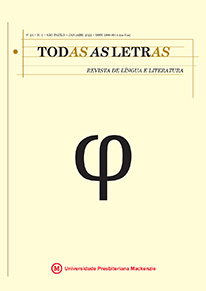A estrutura retórica da seção de resultados e discussão de artigos científicos dos colégios de Ciências da Vida e de Ciências Exatas, Tecnológicas e Multidisciplinar.
Palavras-chave:
Artigo Científico, Escrita acadêmica, Material multimodal, Estrutura retórica, RSTResumo
Este trabalho tem como objetivo investigar a estrutura retórica da seção de resultados e discussão de artigos científicos dos colégios de Ciências da Vida e de Ciências Exatas, Tecnológicas e Multidisciplinar. Além de investigar as relações retóricas, também são descritas as marcas linguísticas que sinalizam as relações. O modelo teórico-metodológico adotado é o da Rhetorical Structure Theory (RST), uma teoria descritiva que estuda a organização dos textos, caracterizando as relações que se estabelecem entre as partes do texto.
Downloads
Referências
BAZERMAN, C. Shaping Written Knowledge: the genre and activity of the experimental article in Science. Madison: The University of Wisconsin Press, 1988.
CARLSON, L.; MARCU, D. Discourse Tagging Reference Manual. Los Angeles: University of Southern California, 2001.
CHAUI, M. A universidade pública sob nova perspectiva. Revista Brasileira de Educação, n. 24, p. 5–15, 2003.
FELTRIM, V. D.; ALUÍSIO, S. M.; NUNES, M. DAS G. V. Analysis of the rhetorical structure of computer science abstracts in Portuguese. UCREL Technical Papers. Proceedings... . p.212–218, 2003. Lancaster: Lancaster University.
GARCIA, O. M. Comunicação em prosa moderna. 17. ed. R. de Janeiro: FGV, 1985.
KIRSCHNER, C.; ECKLE-KOHLER, J.; GUREVYCH, I. Linking the Thoughts: Analysis of Argumentation Structures in Scientific Publications. Proceedings of the 2nd Workshop on Argumentation Mining. Proceedings... . p.1–11, 2015. Stroudsburg: Association for Computational Linguistics.
MANN, W. C.; THOMPSON, S. A. Rhetorical Structure Theory: toward a functional theory of text organization. Text, v. 8, n. 3, p. 243–281, 1988.
MANN, W. C.; TABOADA, M. RST Web Site. Disponível em: <http://www.sfu.ca/rst>. 2010. Acesso em 17
RODRÍGUEZ-VERGARA, D. Rhetorical relations in English and Spanish research articles: An analysis of introductions and conclusions from the perspective of two functional theories. Linguistics and the Human Sciences Sciences, v. 13, n. 1–2, p. 20–46, 2017.
SWALES, J. M. Genre analysis: English in academic and research setting. Cambridge: Cambridge University Press, 1990.
TABOADA, M. Implicit and explicit coherence relations. In: J. Renkema (Org.) Discourse, of course. p.125–138, 2009. Amsterdam: John Benjamins.
TRAINOR, F. X.; MCLAUGHLIN, B. K. An Inductive Method of Teaching Composition. The English Journal, v. 52, n. 6, p. 420–425, 1963.
WATERS, L. Enemies of promise: publishing, perishing, and the eclipse of scolarship. Chicago: Prickly Paradigm Press, 2004.
ZELDES, A. rstWeb - A Browser-based Annotation Interface for Rhetorical Structure Theory and Discourse Relations. Proceedings of NAACL-HLT 2016 System Demonstrations. Proceedings... . p.1–5, 2016. San Diego: NAACL.
Downloads
Publicado
Como Citar
Edição
Seção
Licença
Os direitos autorais dos artigos publicados na Todas as Letras pertencem aos autores, que concedem à Universidade Presbiteriana Mackenzie os direitos exclusivos de publicação do conteúdo. É vedada sua reprodução total ou parcial sem a devida autorização da Comissão Editorial, exceto para estudo e pesquisa.




